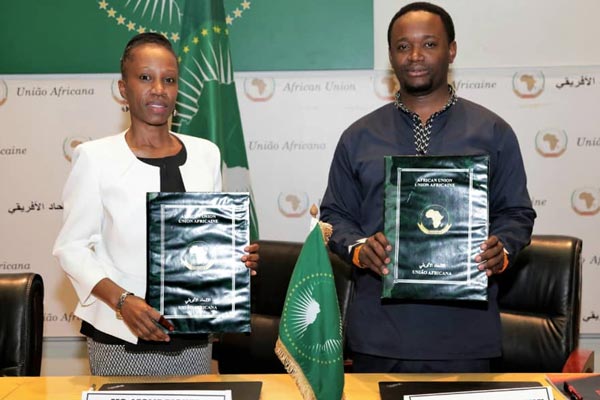
BY WINSTONE ANTONIO
FOUNDER and editor-in-chief of the Book of African Records Kwame Muzawazi says he is humbled by the renewal of the remarkable partnership with the African Union Commission (AUC) for the joint publication of what he described as the Africa’s ultimate reference book of facts, The Africa Factbook.

The AUC director for information and communication Leslie Richer signed the Memorandum of Understanding (MoU) on behalf of the commission while Muzawazi represented Book of African Records at a recent ceremony held at the AU headquarters in Addis Ababa, Ethiopia.
Book of African Records is a research and educational institution that collects, collates, authenticates and promotes African facts, records and information.
In a joint statement, the signatories said significant progress has been made towards the realisation of the first edition of the much-awaited publication after the signing of the first MoU in December 2016.
“The Africa Factbook will contain useful facts about Africa and the African peoples for the purpose of information dissemination, education, entertainment, reference, statistics and documentation,” the representatives said.
“The African Union Commission has deemed the project to be in line with the AU Pan-African Vision of Agenda 2063 and Aspiration Five, which seeks to enhance the strong cultural identity, common heritage, values and ethics of Africa.”
The first edition is expected to be presented to the African Union Assembly in January 2020 and research work is underway in Zimbabwe where Africa Factbook is based.
- Chamisa under fire over US$120K donation
- Mavhunga puts DeMbare into Chibuku quarterfinals
- Pension funds bet on Cabora Bassa oilfields
- Councils defy govt fire tender directive
Keep Reading
They representatives said African ministers responsible for communication also backed the need for Africa’s own home-grown source of reference information.
“This was in November 2017 at the Second Ordinary Session of the African Union’s Specialised Technical Committee on Communication and ICT where ministers reiterated the African Union’s commitment to the project and also called upon member states to adopt the Africa Factbook as an educational tool, to enhance their knowledge of and pride in Africa.”
Muzawazi told The Standard Style that the partnership was a breakthrough for Zimbabwe on the international stage, as the country has been given the mandate to produce reference literature to be used by more than one billion Africans and beyond, as the recognised ultimate official book of African facts.
“This development is more so timely and, indeed, a marvelous shift of the pendulum, in view of the monstrous and malicious economic strangulation and diplomatic sabotage that Zimbabwe, as a country, has incurred at the hands of powerful world governments and global media empires, thanks in large part to the spread of manipulated or fabricated information on Zimbabwe,” he said.
As part of the project, an international conference on The Africa Factbook was held in March last year in Harare and was attended by over 200 delegates from across Africa that included African regional economic communities, African countries who are member states to the African Union, and experts on African history and culture among others.











